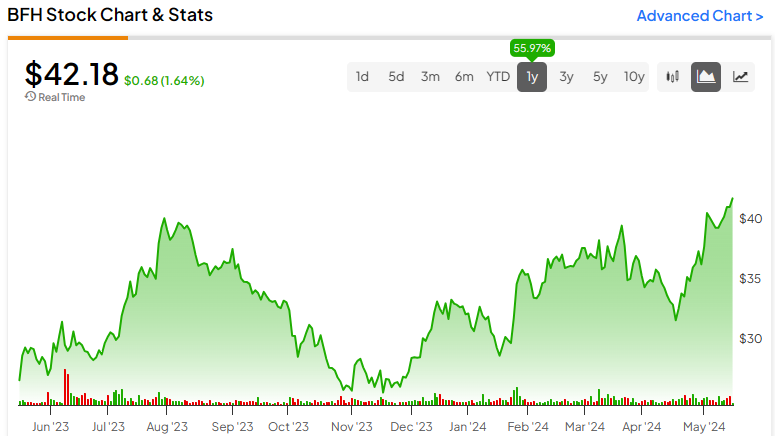Bread Financial Holdings (New York Stock Exchange:BFH) share price has increased over 55% over the past 12 months. Until its recent first-quarter update, the consumer finance company had beaten consensus earnings estimates for six consecutive quarters. Given this momentum, the previous $300 stock Seem Like a worthwhile investment. However, the harsh consumer spending environment may continue to put pressure on short-term results. In addition to potentially harmful regulatory changes, I think BFH stock is a stock to avoid for now.


Bread Financial, based in Columbus, Ohio, provides a variety of financial services to individuals, including credit cards, loans, and high-yield savings accounts. The digital-first company, formerly Alliance Data Systems, helps financial brands grow in addition to offering a variety of direct-to-consumer solutions.
Since revisiting pandemic-era lows in the $20s last year, Bread Financial stock has returned to the low $40s. Investors shrugged off disappointing first-quarter results, including a 23% year-on-year drop in revenue, which led to lower-than-expected profits. Higher interest expenses, higher credit losses, and lower late fee income were all factors. The company's decision to sell its BJ's Wholesale Club Card business in February 2023 also contributed to the revenue shortfall.
I like that Bread Financial has the potential to benefit long-term from the growth of digital finance, but I'm neutral on the stock for now. The first quarter report suggests that the weak consumer spending environment will continue to have a negative impact on short-term finances.
Inflation, high interest rates and tight credit conditions will make growth in Bread Financial's core credit business difficult in 2024. The situation could get even worse if the review of credit card late fee regulations becomes hotly contested. For these reasons, my view is consistent with the stock's Neutral Smart Score of 7/10.
Let's take a deep dive into recent events surrounding credit late fees and what Wall Street thinks about Bread Financial stock.
Credit card late fee issue has reached an impasse
In March 2024, the Consumer Financial Protection Bureau (CFPB) announced a ban on “excessive” late fees on credit cards. Critics of the CFPB and the financial sector have long argued that these fees target low-income households and people of color.
A federal judge in Texas last week blocked the Biden administration's new rule capping credit card late fees at $8. This is a significant reduction from his usual $30+ fee. A judge granted the banking industry an injunction freezing restrictions that were scheduled to take effect on May 14.th. This was a big win for consumer finance companies like Bread Financial, which makes a lot of money from late fees, but it may be temporary.
The court ruled that the new restrictions exceeded the CFPB's authority, a decision that consumer advocates opposed. This suggests that the legal battle over late fees will continue and may reach the Supreme Court. Given the large differences between the government's proposal and current late fees, there appears to be plenty of middle ground to reach a compromise. Perhaps setting the cap at $15 or $20 will ultimately satisfy both parties.
Either way, the fact that the problem persists is a negative for Bread Financial. Uncertainty is a source of risk and a reason to remain on the sidelines for now.
Analysts have very different views on Bread's financials.
Wall Street research groups can't agree on Bread Financial's stock either. Of the opinions provided in the past three months, most analysts are neutral. BFH currently has 7 hold ratings, 3 buy ratings, and 1 sell rating.
One of the company's newest bulls is Sanjay Sakrani of Keefe Brouillette. Earlier this month, the five-star analyst upgraded the company from Market Perform (Hold) to Outperform (Buy). With an impressive success rate of 70%, Sakhrani has also upgraded his credit service peer, Synchrony Financial (New York Stock Exchange:SYF) to this month's market performance. On Monday, Bread Financial received another Buy rating courtesy of Bill Ryan of Seaport Research.
At the other end of the spectrum is Barclays' Terry Ma (New York Stock Exchange:BCS). Following Bread Financial's first quarter results update, the analyst maintained a “sell” rating on the stock.
I understand the potential reasons to avoid Bread Financial, but I wouldn't call it a “sell.” Considering the stock's value proposition, the downside from here appears to be fairly limited. First, the company trades at about 7.5 times this year's expected earnings. A dividend yield of 2.1% and an aggressive share repurchase program further suggest that BFH offers good value.
What is the consensus target price for BFH stock?
The average price target for Bread Financial stock is $41.10, which translates to 2.65% downside. However, keep in mind that analyst opinions on the stock vary widely, and so do their price targets. The target range is $26.00 to $67.00, implying 38.4% downside and 59% upside, respectively.


BFH stock conclusion
Bread Financial is feeling the effects of a cautious consumer spending environment, especially given its clients' exposure to discretionary sectors such as airlines, cruise lines and department stores. The outcome of the legal battle over late credit card fees and the outcome of the company's June 18 investor day event could determine whether bread prices continue to rise or become toast.
disclosure


